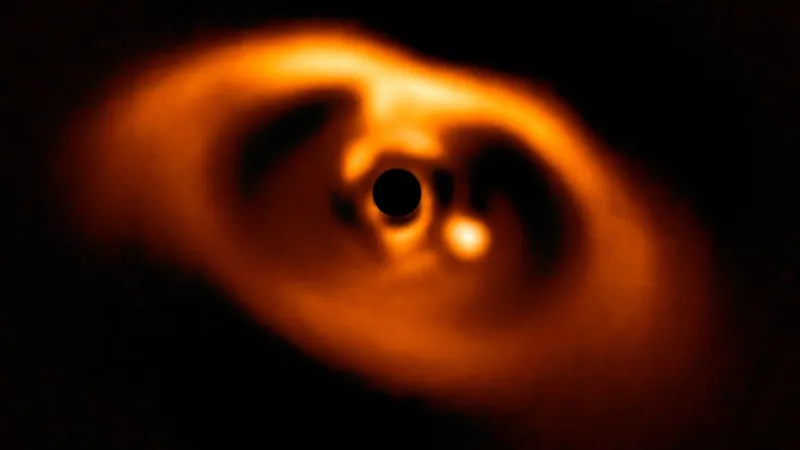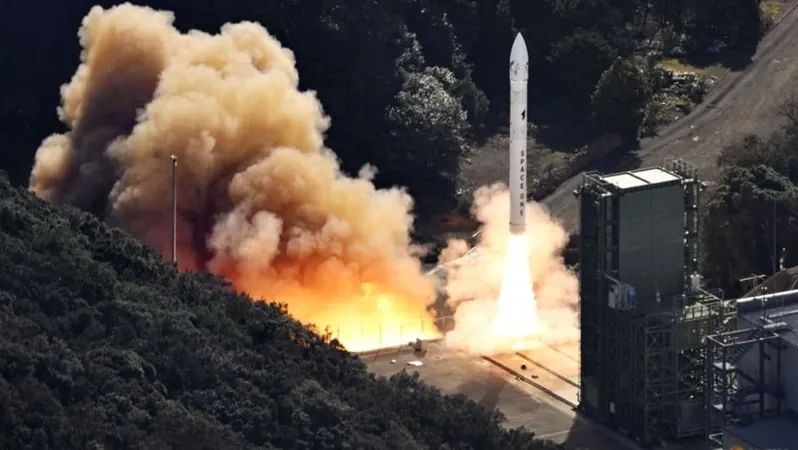
Groundbreaking Revelation in Alien Planet's Atmosphere Challenges Long-standing Theories of Planet Formation!
2024-12-18
Author: Wei Ling
A shocking new study has emerged that could upend our understanding of how planets form!
Astronomers examining a still-developing planet beyond our solar system have discovered that its chemical composition diverges significantly from the expected characteristics of the swirling gas and dust disk from which it originated. This revelation raises serious questions about the long-held models of planet formation that have guided scientists for decades.
The planet in question, known as PDS 70b,
is a colossal gas giant nearly three times the size of Jupiter, situated about 400 light-years away in the constellation Centaurus. What sets this system apart is that PDS 70b is part of a rare two-planet arrangement where planets are still in the process of coalescing. This dynamic environment offers a unique opportunity for astronomers to investigate the connection between young planets and their natal disks. Orbiting its host star at a distance similar to Uranus, PDS 70b is believed to be nearing the end of its formative stage after having amassed mass for roughly 5 million years.
Astrophysicists utilized the powerful Keck II telescope
in Hawaii back in May to analyze the chemical makeup of PDS 70b, particularly focusing on the levels of carbon monoxide and water vapor present in its atmosphere. These elements are pivotal indicators of how planets form, as they rank among the most abundant elements in the universe after hydrogen and helium. By comparing their findings to existing data on the gases found in the system's protoplanetary disk, they were astounded to find that PDS 70b's atmosphere is markedly deficient in carbon and oxygen than anticipated. Their findings were documented in a recent paper published in the *Astrophysical Journal Letters*.
Lead researcher Chih-Chun Hsu
a postdoctoral astrophysicist at Northwestern University in Illinois, remarked, "This was quite unexpected, and it illustrates that our commonly accepted conception of planet formation was oversimplified."
The Mystery of Planet Formation Deepens!
Traditionally, scientists believe that planets—including those in our own solar system—form through a process called accretion, where particles in the protoplanetary disk collide and progressively combine to create larger bodies. This understanding implies that planets should share a chemical composition with their surrounding disks.
However, the PDS 70b findings have led researchers to propose two intriguing scenarios to explain this discrepancy. One theory suggests that the planet primarily gathered its carbon and oxygen from solid materials like ice and dust, rather than directly from the gas-rich protoplanetary disk. If this hypothesis is correct, the ice and dust that PDS 70b formed from would have vaporized before becoming part of the planet, profoundly affecting its carbon to oxygen ratio.
Recent observations from the James Webb Space Telescope have supported this potential pathway, suggesting that the solid components might significantly influence a planet's atmospheric composition.
On the other hand, the second scenario posits that the protoplanetary disk itself could have only recently become enriched in carbon, as some existing models of planetary evolution predict. While the current data is insufficient to conclusively determine which scenario holds true, the upcoming observations of PDS 70b's neighboring planet, PDS 70c, may provide the necessary insights to unravel this cosmic riddle.
"We have to study these two planets together to decipher the system's formation history with greater clarity," Hsu added. "But this is merely one system. To truly grasp the intricate processes of planet formation, we need to identify more such systems across the universe."
As we pause to reflect on the implications of these findings, one thing remains clear: the universe is full of surprises, and our understanding of planetary formation is on the brink of transformation! Stay tuned as we continue to unravel the mysteries of our cosmos!



 Brasil (PT)
Brasil (PT)
 Canada (EN)
Canada (EN)
 Chile (ES)
Chile (ES)
 España (ES)
España (ES)
 France (FR)
France (FR)
 Hong Kong (EN)
Hong Kong (EN)
 Italia (IT)
Italia (IT)
 日本 (JA)
日本 (JA)
 Magyarország (HU)
Magyarország (HU)
 Norge (NO)
Norge (NO)
 Polska (PL)
Polska (PL)
 Schweiz (DE)
Schweiz (DE)
 Singapore (EN)
Singapore (EN)
 Sverige (SV)
Sverige (SV)
 Suomi (FI)
Suomi (FI)
 Türkiye (TR)
Türkiye (TR)